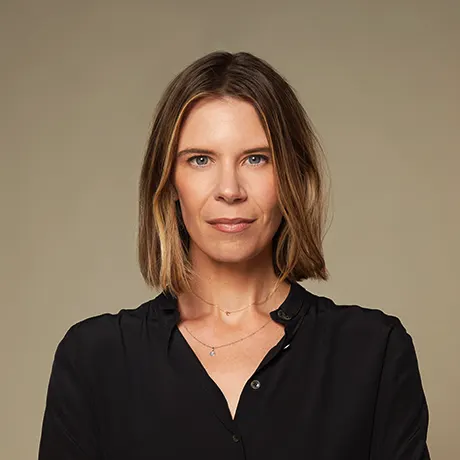Stay in the know
All our latest podcasts delivered right to your inbox.
Writer and mom Jen Barton was in a strange place recently. For the first time in forever, she wasn’t feeling overly anxious or depressed. She felt creative and was bonding with her kids. But still, something “wasn’t right.” She started looking under every rock for an answer to her disorganization, “ditziness,” and chaos. What she found was ADHD.
Now 39 and a mother of four, Jen talks about ADHD in women, parenting with ADHD, and how her perspective has changed now that she’s been diagnosed with ADHD.
Related resources
Jen’s British Vogue article: Why does no one believe my ADHD diagnosis?
Episode transcript
Announcer: Discover all of Understood's podcasts, where we talk candidly about challenges with reading, writing, focus, and other learning differences. Our podcasts bring new voices and perspectives you won't hear anywhere else. Explore the highs and lows of raising kids with learning challenges. Learn about the surprising ways ADHD symptoms can surface in kids and adults. And hear stories from working professionals who learn and think differently. On the Understood Podcast Network, there's a podcast for everyone. Find your new favorite today at u.org/podcasts or wherever you find your podcasts.
Jen: So, I'm someone who has always been chaotic, overwhelmed, and I have a lot going on. So, there's always an excuse for my chaos. I lost my mom when I was 23. And then by 27, I was pregnant with my first and then have been having children until the last few years, basically. So I haven't really come up for air.
And this was the first time that I was able to be lucid. I didn't have hormones coursing through me. I wasn't pregnant or trying to get pregnant or feeding or whatever it was. And I wasn't actively grieving in the way that I think I had been through so much of this period. And then I realized that actually, hang on, I'm 39. I'm not anxious right now. I'm not depressed. But something is not working for me. I cannot do certain things. I am struggling to compute in certain ways. And that's what made me start thinking that, hang on, something else is going on because I know what mental health stuff looks like, and this was not that.
Laura: From the Understood Podcast Network, this is "ADHD Aha!" — a podcast where people share the moment when it finally clicked that they, or someone they know, has ADHD. My name is Laura Key. I'm the editorial director here at Understood. And as someone who's had my own "ADHD Aha" moment, I'll be your host.
I'm here today with Jen Barton. Jen is a freelance writer who's from New York but lives in London. She has four kids, and she has ADHD. Welcome, Jen.
Jen: Thanks so much. It's so nice to be here.
Laura: So Jen, I want to ask you about the article that you wrote for "British Vogue," called "Why Does No One Believed My ADHD Diagnosis?" I was instantly drawn to this title for many personal reasons, but my main question for, you just to kick things off, is why did you decide to write this now?
Jen: So, I'm someone who has had ADHD their whole lives, but I haven't known it. So it's something that I've only recently discovered about myself through research and putting some puzzle pieces together that make up my personality and a lot of the things I excel at but also struggle with. And I now have a confirmed diagnosis from a psychiatrist, which in my understanding is how you sort of are fully diagnosed, which isn't the easiest process. And I feel lucky that I've been able to go down that road to get that assessment.
That's just been a very recent journey for me. So this is the last six months of my life have very much been focused on this and recognizing this. And looking back, and also looking forward, thinking about how I'm going to lead my life now that I'm aware of this, because a lot of things have clicked into place.
Laura: You mentioned putting the puzzle pieces together. What pieces did you put together?
Jen: So, I'm someone who has always been chaotic, overwhelmed, and I have a lot going on. So there's always an excuse for my chaos. I can't really function that well in a lot of ways, but I have four kids and they're, you know, until recently were all under 10. So of course I'm chaotic.
And suddenly the pandemic happened and I really went into myself. I actually found it quite calming not having to do the scheduled everything, even though it was difficult trying to keep everyone happy at home. But actually I find life stressful. I find scheduling stressful. I find getting places on time stressful. So not having that really allowed me to breathe. And it was also this sort of recognition of being in probably the best mental health place I'd been in for my entire adulthood. Because I lost my mom when I was 23. And then by 27, I was pregnant with my first and then have been having children until, you know, the last few years basically. And so have been in that sort of cycle. So I haven't really come up for air.
And this was the first time, I guess you could say that I had come up for air, that I was able to be lucid. I didn't have hormones coursing through me. I wasn't pregnant or trying to get pregnant or feeding or whatever it was. And I wasn't actively grieving in the way that I think I had been through so much of this period, because it had been 15 years since that had happened.
And I was in this very strange place for me, which was happy and calm and not overly anxious and not depressed. And I felt creative, and I felt like I was bonding with my kids. However, something was weird, something wasn't right. And I couldn't pinpoint it. And I was struggling to find it. And you know, this is why I went into therapy.
I was looking under every rock, trying to figure out what this thing was. And nobody was giving me the answer. Until suddenly I started seeing all of these things about how, you know, all of these terms that I had been referred to my whole life started coming together as a diagnosis. And that was just a very sort of, I think that was an "aha!" for me, because everyone had always called me really ditzy and I was always considered really out of it and kind of, I don't know, lost and messy and disorganized, and I can't clean my house. And I remember having this conversation with my friends, saying I'm really stressed out because the pandemic has made my house unlivable practically. I don't know what to do, but I don't even know where to start. And she had sort of said, oh, well, you're probably too depressed to clean.
And that really stood out for me because I wasn't depressed. I said, no, I'm happy. I just can't physically do it. So it's sort of this combination of those moments, maybe it was that conversation even.
Laura: What types of symptoms were bubbling up to the surface for you that were different, that felt different than say anxiety or other things that you may have struggled with?
Jen: So, I've never been good at paperwork. I live in London and I'm from New York. And so I've definitely been a person who, over the course of my time here, has applied for visas and filled out the paperwork wrong and, you know, been denied a visa. So things that are quite potentially stressful life-changing experiences have become almost debilitating.
So because of that history, I can't even look at paperwork. I had four passports that had expired, and the idea of renewing them was, you know, making me feel really quite unwell, physically, just even thinking about it, let alone even attempting to contemplate it. So that type of stuff. There's a lot of sort of normal quote, unquote adult functioning behavior that I struggle with.
So I don't drive. I get lost all the time, and I get really panicked when I'm driving. So I try not to drive, which when you have four children and they have all different activities, can be difficult. So there's sort of a few things like that. And I've been relying more and more on my husband who is very organized and very good at this stuff to do that.
And that made me on the one hand feel really lucky that he was so helpful and amazing, but on the other hand, feel really worried because I, you know, I pride myself on being the self-sufficient working functioning creative person. And actually, I wasn't really functioning that well.
Laura: I have to share this with you, Jen, because it's so similar to what you just said. I just changed my name a few months ago. I've been married for 10 years. I was so overwhelmed at the thought of updating my paperwork. I could not find a way to start that task. And I finally kind of gathered myself with the help of my husband. I was like, I want to change my name.
Jen: Well, that's amazing. That's such a huge step. So I'm really happy for you that you managed to do that because I know personally how I feel about things like that. And that, to me, that would be a huge achievement.
Laura: Can you tell me what you used to think ADHD was?
Jen: Growing up in New York, and being in high school in the '90s at a certain type of school, there was definitely this thing of like ADHD was a way to get extra time on tests. It was definitely like a pushy parent wanting it for their kids kind of thing. So those were sort of my ideas of ADHD. But now I think, oh gosh, it would have been really helpful if I had had that diagnosis sooner.
Laura: And how is that different from what you know now? What does it look like in you? Can you describe your symptoms for me?
Jen: Yeah. So actually, according to my psychiatrist, I have pretty severe ADHD, which is interesting to me because it's astounding that I haven't known this for 39 years.
My biggest symptoms are, I guess you could describe me as either being kind of out of it or lost a little bit and — both the literal sense. I mean, I lived in New York for decades. And I couldn't tell you, if you asked me for directions in New York, I would probably send you in the wrong direction. My executive functioning is off-key.
I lose things all the time. I lose my keys, you know, multiple times a day. Now I've started losing them permanently. I've had to buy these giant sort of stuffed animal keychains just to keep track. The more I have going on, the more likely I am to sort of mess up.
But then at the same time, I'm incredibly impulsive. And impulsivity for me looks, again, different to what I thought impulsivity could look like. So my impulsivity is, I can't say no. Someone will ask me to do something and I won't have time, or I won't be able to, but I won't be able to address that or even take a beat to say, let me check. I'll just say yes. So I have days where I'll have 25 to 30 things scheduled — not an exaggeration — and will attempt to do all of them because I still don't have a sense maybe that this is not feasible. And so that's been a big sort of struggle and obviously an increasing struggle as I'm trying to manage my children's schedules, as well as my own.
Laura: There's something that happens a lot on this show, and it's not something that I anticipated, but it's something that I find really kind of cathartic, at least personally. On this show, when people come on, especially adults who are talking about their own later-in-life diagnosis, I find that they often retrace their steps from when they were kids. And there's a lot of looking back and remembering things that happened when you were growing up that you never thought about in a certain way until now. And now you have this diagnosis and you're like, oh, that's why. Does that ever happen for you?
Jen: Yes, I've been doing a lot of that in my life, just because you do sort of want to understand how this has manifested in different ways. But definitely as a child, whenever I had to do anything independently, it was always a bit of a hit-or-miss situation. So I'd become obsessed by things. So I was obsessed with books, like totally obsessed. So I could read nonstop anything related to English or literature or reading was just amazing. And I was hyper-focused on and wonderful. And then I would get to some other stuff that I should have been OK at, and I could not even begin to engage.
But that's something that I've been thinking about a lot, because I've always just thought, oh, I'm really bad at math, for example. And actually now I think, well, maybe I wasn't really bad. I just didn't have the tools to learn it at the time. And then I also, I used to be a classical ballerina. So I used to really train very intensively, for 10 years alongside school. And I do wonder, cause it's really interesting, cause I think, well, I was never hyperactive. But then I, on the other side of the coin, I think, well, hang on, I was dancing intensely for about five hours a day with schoolwork for years and years. So of course, none of that sort of energy would manifest itself maybe in a negative way, because it was all being poured into this.
So there are definitely things that are making a lot more sense to me now that I'm older and have the benefit of hindsight. I'm definitely also putting things together between a lot of my mother's behaviors — I just grew up with my mom. There were no siblings, it was just the two of us. And a lot of things, you know, I think what you think is your norm, because it's what you experienced, I'm now starting to think, hang on. A lot of her behaviors, actually, might've been ADHD sort of related, and that's something that I'm also fascinated by.
Laura: Tell me more about your mom. What was she like?
Jen: I mean, she was wild. She was amazing. Just very creative and quirky and marching to the beat of her own drummer. And I think one of the reasons I could never see myself also as sort of being neurodivergent is because I seem so tame. So I think that because she was my barometer, there's no way I could think I was anything other than whatever she wasn't. But now I'm thinking, hang on a second. I sort of go left when everyone goes right. And I'm quirky in my own way. And I have my own style. And so I'm starting to think, hang on, maybe the apple hasn't fallen quite so far from the tree.
Laura: How about your husband? How does he feel about your diagnosis? Does it make sense to him? Is he like, oh yeah, of course.
Jen: It's definitely been, I'd say, interesting for our marriage and good for our marriage. It makes sense to him in a lot of ways. I've known my husband since I was 20. So a large part of my growing up has been with someone alongside me who can say, I now understand why this and this and this were happening.
That's another thing, I guess. I used to really take things very personally. My sensitivity was off the charts. I was always called super intense by people who never knew me. And that's been a big struggle my whole life. So he's had to deal with a lot of it because he's known me for a long time. And one of the best things that he's seen come out of this is that I'm on a low dose of medication from ADHD, and the emotions have really quietened.
And it's not that I've changed or become someone different. I'm still me. I'm still creative and funny and quirky. But, oh my gosh, I'm not raging or sobbing or mad at myself and telling myself I'm horrible. That took up a lot of emotional energy for both of us. So that's been really good.
Laura: Can you tell me about before you took medication and — you used the word "raging." Can you tell me about that?
Jen: One good example that I can think of is, so I was in therapy, this sort of delayed grief therapy over the pandemic, and it quickly became apparent that actually a lot of the stuff that I thought that I was worried about — well, this is one of the reasons I ended up getting the ADHD assessment — is that I thought I was really upset about grief and abandonment from my dad. And then it turned out that a lot of what I wanted to talk about with the therapist was actually what was going on every day. Like, I'd have this sort of irrational fight with my eldest who's a tween, and it was always escalating.
And then I was like, I'm the adult. Why am I escalating this? And I couldn't really understand. And it was becoming something that was really upsetting for me because I wasn't really being the mom in that situation. I was being like the wounded friend. And that has been a pattern my whole life. And so it was sort of recognizing that.
Or, you know, I would just go from zero to a thousand, based on nothing, but it wasn't in my control. And then afterwards I would be sort of ravaged by guilt. And it's not like anything would happen. I mostly would just sort of sob and have to take myself out of the situation. But it was very difficult, I think, to be around me.
Laura: Oh, wow, Jen. Yeah. I am so much more of an adult, I guess, quote, unquote, with my kids when my medication is on and working at night. I think you used the term "wounded child" — that happens with me as well. And it just makes me feel so awful when I act like that. It makes me feel ashamed. And I feel guilty and like, come on Laura, you're better than this.
Jen: Two things have been transformative. A: Recognizing that there's a name for all of this stuff, that it's not just that I'm bad at stuff or that I'm nonfunctional. You know, you start to really beat yourself up if after 10, 20, 30 years of still not being able to do this thing that everyone else seems to find effortless. You start to call yourself names, or at least that's what I was doing. In my head, I really thought I'm a massive loser failure, and why do I find everything so hard? So just even knowing was huge for me because it made me feel like, hang on, I'm not alone. I'm just different. And I just need different ways to approach things and to be gentle on myself about things and to recognize what I need help with and what I don't.
So that was already huge. And then the medication was also just really helpful because it just regulated me in a way and helped me to think straight and to concentrate. Often, a lot of my moods would come from me being totally distracted and unable to do what I needed to do, than to procrastinate. And then to end up in like a tearful puddle, which then would be exacerbated by someone saying something. So even, you know, just having that in place is really helping.
Laura: You've told me a lot about your experience with your husband and with your kids. What about the outside world?
Jen: Well, something really striking that's happened is my social anxiety had gotten really bad. And to the point where in recent years it was paralyzing. I would say something to a stranger, which was totally irrelevant to anything, it didn't matter what they thought of me. It was an innocuous comment, I should say. And I would come home and I would genuinely spend hours panicking, stressing, sort of pacing, really intensely worried and sick to my stomach about the implications of this sort of imagined disaster. And that was becoming an increasingly big issue.
And since I've started the medication and identified the ADHD, A: That doesn't happen anymore. I can have much calmer, just social interactions that I don't take home with me. And the other thing is I just feel like I can be a lot gentler on myself about things. So my anxiety has gone way down, because a lot of the things that I used to stress about — it doesn't feel like they matter in the same way anymore. So I'm getting much better at separating that.
Laura: What is it like parenting four children when you have ADHD?
Jen: Well, I love parenting a lot. I love a lot of the stuff that parents are supposed to not really be into. Like I'm really into the newborn stage when you're just cooing and hanging out with them. And they're, you know, sort of your — we used to do these book mornings where I'd have all of my kids on top of me and I'd be feeding a newborn and we would just read like a thousand books.
And I love that stuff a lot. I love parenting, especially when it's on my own terms. So we definitely do a lot more sort of like free-range parenting type stuff. And, you know, the kids are exposed to a lot because, you know, I'm impulsive. And a lot of my impulses are quite fun. So like we were roller skating nonstop over lockdown. And then now I have a skateboard and so we're skateboarding.
And so we definitely do lots of fun adventure things. But it's a lot less formal and a lot less routine and structured, because I find that stressful.
Laura: Everything you're describing — first of all, just like your fun attitude, right? The roller skating. I can picture you roller skating through the pandemic. Do you think that ADHD makes you a better parent?
Jen: It's interesting because I actually wrote an article saying precisely that. Since I've been diagnosed, I've been trying to gobble up every sort of experience that I can with ADHD. So I'm constantly looking for other people's experiences. But there's a lot to celebrate and there's a lot to learn from — I really believe that like the more sort of diversity that we have in terms of everything, the more amazing and exciting, and the more we can all learn. And I feel like neurodiversity is one aspect of that. Like how interesting is it to have someone whose brain is thinking about things in a completely different direction, or who finds something that you find utterly unremarkable. And they're so passionate about it. They find it absorbing and they can do it for hours. And that's certainly something that I do like to think that I can bring to the equation as a parent.
I mean, obviously the parenting journey is long and I'm still early in the game and there are a million challenges. And I guess just a final thing to say about kids and ADHD is the reason I'm most grateful for my diagnosis is not just for me, but because I'm pretty confident that at least one of my children also has ADHD. And I'm now starting to explore that path. And I feel so empowered for them because I just feel like they're going to have this advocate. And I think it's going to be ADHD in a way that's — or at least it looks like it might be presenting in a similar way to the way mine did. So no one is flagging this child. However, I feel very strongly because I'm seeing a lot, it's bringing up a lot of emotions of myself in middle school.
Laura: In terms of being an advocate, one of the things that really drew me in to your "British Vogue" article was the title: "Why Does No One Believe My ADHD Diagnosis?" Jen, that is such an alluring title. And it makes me wonder, have you found that people aren't actually believing your ADHD diagnosis?
Jen: I think there's definitely the sense of, you know, I have a fairly traditional path in terms of my schooling. I never had any problems with education. I went on to higher education. I had all of these sort of life obstacles and sort of, you know, quote, unquote bounced back. And so a lot of the things that I've done in my life, it's really funny, because a lot of them make sense to someone who has taken my path in life, but actually really make sense if you have ADHD.
So for example, I could never do an office job. That was a huge struggle for me. And so I haven't worked in an office since my mid 20s. And people, as soon as I got pregnant at 27, people were like, oh, that makes sense. This is why you didn't want to work in an office. And I, you know, you sort of let people go with it, but it's like, no, I like physically can't work at an office because it's too stressful for me and I can't handle it and I need to be, you know, in my own space and I'm too distracted and all this stuff. And so all of these things that have sort of happened, it's really interesting. Cause I think, oh wow, that's ADHD.
But then from an outsider's perspective, it's like, no, that's not ADHD. You did that because you had kids and you want to spend time with them. Or of course you forgot that. I mean, how can you make it out the door with four kids? And I think people wanted me to feel like I was, you know, quote, unquote normal. But I've never, you know — nothing in my life circumstances has been really normal. And I'm OK with that.
Normal is not always better. Normal is not always the best. And I think that being able to say that and to say, I have ADHD and I'm OK with that, and I want help, or I might struggle, or I might interrupt, or this might happen, or you need to explain that to me, I feel so much happier being able to say that than I did just sort of feeling like I have no idea what's going on and everyone else seems to.
Laura: There are so many more stories about women getting diagnosed with ADHD later in life. I find it so exciting and heartening, and I imagine that maybe in — I'm hoping that in 10 years, or no, how about in two years, that title wouldn't work for your article?
Jen: Yeah, no, the stories have been amazing. I guess the other side of the coin is that there are definitely some people who are sort of like, hang on. What makes you think that you might have this? Because I'm trying to put a few things together and I'm thinking, so that's the other thing. So there's definitely a few people, I think, coming out of the woodwork with their own awareness of things, because you know, women are radically underdiagnosed is my understanding. And especially ones who have sort of slipped through the cracks, managing to, you know, tick all of the boxes that were meant to be ticked on the path of whatever. And then it's only now maybe that they've stopped or changed career or done something else that they're starting to realize, hang on a second. Like maybe this is leading back to something else.
Laura: It's kind of amazing to me that you've only had this diagnosis for as short a period of time as you do. I've been diagnosed for 10 years, and I cannot articulate my experience nearly as clearly as you have.
Jen: Thank you. There is not one element of my life — I know, you know, people say "I don't want my condition to define me," and that's fine. But at the same time, I can't think about anything in my life that this doesn't touch on somewhat. And I have to think of that as a positive thing in some ways, because otherwise I'm not going to get very far.
Laura: Well, Jen, it has just been so lovely to talk to you. Thank you for spending this time with me. And I hope that you just keep enjoying and helping your kids experience all this joy that it sounds like you're helping them experience.
Jen: Thank you so much. It's been really nice to chat.
Laura: You've been listening to "ADHD Aha!" from the Understood Podcast Network. You can listen and subscribe to "ADHD Aha!" on Apple, Spotify, or anywhere you get your podcasts. And if you like what you heard today, tell someone about the show. We rely on listeners like you to reach and support more people. And if you want to share your own "aha" moment, email us at ADHDAha@understood.org. I'd love to hear from you. You can go to u.org/ADHDAha to find details on each episode and related resources. That's the letter U, as in Understood, dot O R G slash ADHDAha. Understood is a nonprofit and social impact organization. We have no affiliation with pharmaceutical companies. Learn more at understood.org/mission. "ADHD Aha!" is produced by Jessamine Molli. Say hi, Jessamine.
Jessamine: Hi everyone.
Laura: Justin D. Wright created our music. Seth Melnick and Briana Berry are our production directors. Scott Cocchiere is our creative director. And I'm your host, Laura Key, editorial director at Understood. Thanks so much for listening.
Host
Latest episodes
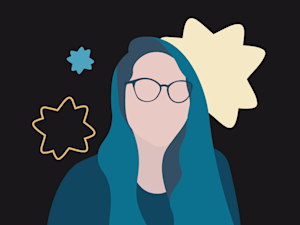
April 16, 2024
ADHD coach Jaye Lin was a gifted kid with undiagnosed ADHD. Now, she’s building communities and helping others cope with ADHD burnout.
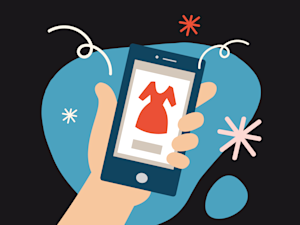
April 2, 2024
Writer Paulette Perhach had money coming in but struggled to keep it in her bank account. An ADHD diagnosis brought her struggles into perspective.
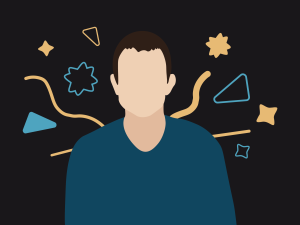
March 19, 2024
Eye to Eye founder David Flink is fighting the “just try harder” myth surrounding ADHD, dyslexia, and other learning and thinking differences.
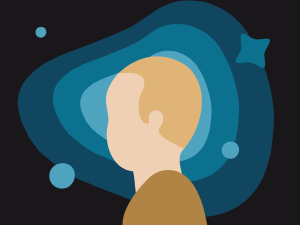
March 5, 2024
Peter Jones used to feel better saying he had a hearing problem rather than considering ADHD. Now, he knows he has ADHD and isn't afraid to say it.
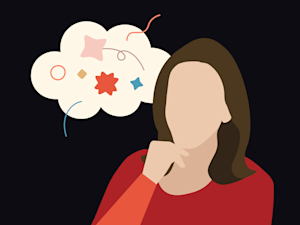
February 20, 2024
Before her ADHD diagnosis, ADHD coach Emily Weinberg thought she was just lazy. But in reality she was stuck in “analysis paralysis.”
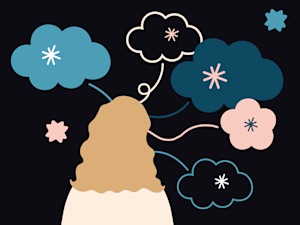
Carol Blumenstein was called an unteachable student. Now, she knows she has ADHD and dyslexia, and supports her five kids who learn differently, too.

January 23, 2024
Executive coach, actor, and former criminal defense attorney Ernest Anemone shares his ADHD story — and why he questions the term “attention deficit.”
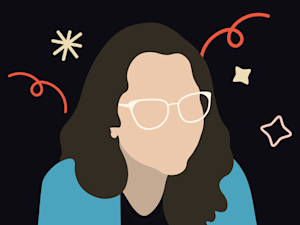
January 9, 2024
ADHD and post-traumatic stress disorder (PTSD) symptoms can look similar. And they can morph into what Hannah calls “a trauma ball of blame.”
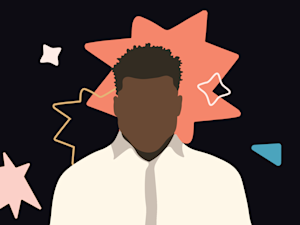
December 26, 2023
Livingston Steele was diagnosed with ADHD about a year into working at Understood.org. His experience and work have given him immense empathy for people with ADHD.
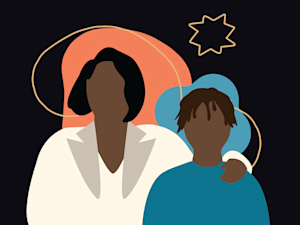
December 12, 2023
Wendy Zanders is a decluttering coach with ADHD. Find out how she got into organizing, and get a few tips for yourself.

